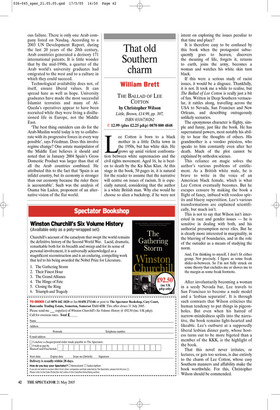That old Southern charm
William Brett
THE BALLAD OF LEE COTTON by Christopher Wilson Little, Brown, £14.99, pp. 307, ISBN 0316730262 ✆ 12.99 (plus £2.25 p&p) 0870 800 4848 Lee Cotton is born to a black mother in a little Delta town in the 1950s, but has white skin. He grows up amid violent confrontation between white supremacists and the civil rights movement. Aged 16, he is beaten to death by the Ku Klux Klan. At this stage in the book, 50 pages in, it is natural for the reader to assume that the narrative will centre on issues of racism. It is especially natural, considering that the author is a white British man. Why else would he choose so alien a backdrop, if he were not intent on exploring the issues peculiar to that time and place?
It is therefore easy to be confused by this book when the protagonist subsequently goes to heaven, discovers the meaning of life, forgets it, returns to earth, joins the army, becomes a woman and watches his white skin turn black.
If this were a serious study of racist issues, it would be a disgrace. Thankfully, it is not. It took me a while to realise, but The Ballad of Lee Cotton is really just a bit of fun. Written in Deep Southern vernacular, it rattles along, travelling across the USA to Nevada, San Francisco and New Orleans, and describing outrageously unlikely scenarios.
The eponymous character is flighty, simple and funny, just like the book. He has supernatural powers, most notably his ability to hear the thoughts of others. His grandmother is a voodoo priestess, who speaks to him constantly even after her death. Much of the plot cannot be explained by orthodox science.
This reliance on magic solves the author’s various problems of entitlement. As a British white male, he is brave to write in the voice of an American black female, which is what Lee Cotton eventually becomes. But he escapes censure by making the book a flight of fancy, imbued with voodoo spirits and bluesy superstition. Lee’s various transformations are explained scientifically, but much isn’t.
This is not to say that Wilson isn’t interested in race and gender issues — he is sensitive in dealing with both, and his authorial presumption never riles. But he is clearly more interested in marginality, in the blurring of boundaries, and in the role of the outsider as a means of studying the norm.
And, I’m thinking to myself, I don’t fit either group. Not precisely. I figure as some freak slider-in-between. So I’m not fully struck on some theory that excludes me or shoves me to the margin as some freak footnote.
After involuntarily becoming a woman in a seedy Nevada bar, Lee travels to San Francisco to become a nude model and a ‘lesbian separatist’. It is through such contrasts that Wilson criticises the human tendency to put things in pigeonholes. But even when his hatred of narrow-mindedness spills into the narrative, the book remains light-hearted and likeable. Lee’s outburst at a supposedly liberal lesbian dinner party, whose hostess turns out to be more bigoted than a member of the KKK, is the highlight of the book.
That this novel never irritates, or lectures, or gets too serious, is due entirely to the charm of Lee Cotton, whose easy Southern manners and affability make the book worthwhile. For this, Christopher Wilson should be commended.

























































 Previous page
Previous page